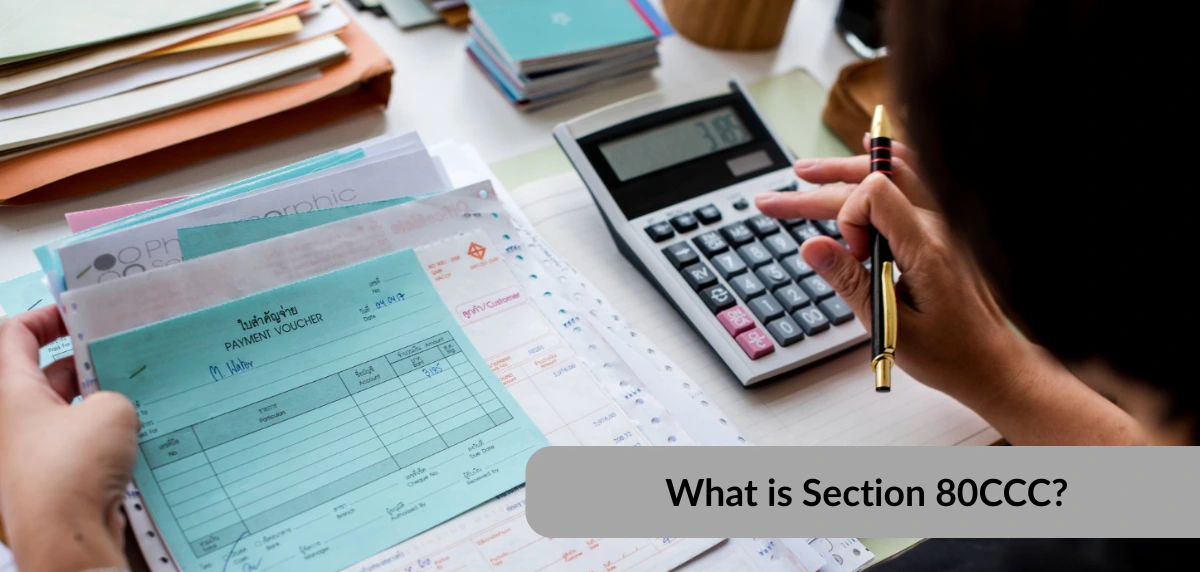Paying taxes is your duty as a responsible citizen of the nation. In addition to taxation, the Indian government also allows you to reduce your tax burden in a legal manner through various deductions. One such helpful provision is section 80CCC of the Income Tax Act of 1961. If you are planning for a financially secure retirement and have invested in pension funds, this section can reward you with tax savings.**
Let’s understand what exactly section 80CCC is.
What is Section 80CCC?**
It is a part of the Income Tax Act that allows tax deductions on investments made in certain pension or annuity plans. Section 80CCC encourages individuals to plan for retirement and enjoy tax benefits along the way by investing in approved pension funds.
It enables a deduction of up to ₹1.5 lakh per financial year on the amount paid towards a pension plan. To qualify for it, the taxpayer must have purchased the plan from specified insurers or other IRDAI-approved insurance companies. These deductions fall under the overall limit of ₹1.5 lakh that is shared with section 80C and section 80CCD(1).
In simple words, if you are buying a pension policy to secure your retirement, section 80CCC can help you reduce your taxable income against its premiums. Using an income tax calculator can help you get clear estimates on how much you can save with Section 80CCC.
Eligibility for Section 80CCC**
Below are the criteria to claim a section 80CCC deduction:
- Only individual taxpayers are allowed to claim this deduction. Hindu Undivided Families (HUFs) are not eligible.
- The individual must have paid for an annuity plan or pension policy from an insurer approved by the Insurance Regulatory and Development Authority of India (IRDAI).
- Both resident and non-resident Indians can claim the deduction under section 80CCC of the Income Tax Act.
- The investment must be made from taxable income, and the deduction cannot exceed the actual income of the individual.
Now that you know what 80CCC is and what its eligibility criteria are, let’s look at the terms and conditions you need to ensure to avail the same.
Terms and Conditions for Availing Section 80CCC Benefits**
Here are the important terms and rules that apply when claiming the 80CCC deduction:
- The pension fund must be approved as per the rules laid down in Section 10(23AAB).
- Any interest, bonus, or gains received from the pension plan are fully taxable.
- The pension payments received after retirement are treated as income and taxed accordingly.
- If the policyholder surrenders the plan, the amount received is also taxable.
- The deduction applies only for the amount paid in the current assessment year. If you pay for multiple years in advance, the deduction can only be claimed year by year.
- The total deduction under section 80C, section 80CCC, and section 80CCD(1) together cannot exceed ₹1.5 lakh.
A key aim of these terms and conditions is to ensure that the tax benefits are ideal for long-term retirement planning, not for short-term tax savings.
As mentioned earlier, only those funds mentioned in section 10(23AAB) are eligible for deductions under section 80CCC of the Income Tax Act.
So, what is the connection between these two sections? Let’s explore.
Relationship between Section 80CCC and Section 10 (23AAB)**
There is a direct link between section 80CCC and section 10(23AAB) of the Income Tax Act. Section 10(23AAB) allows certain pension funds set up by the LIC (Life Insurance Corporation) or IRDA-approved insurers to receive tax exemptions.
Here’s how they relate to each other:
- Only pension funds approved under section 10(23AAB) are eligible for deduction under section 80CCC.
- These pension funds must have been created on or after August 1, 1996.
- The sole purpose of these funds should be to provide retirement benefits, not generate profit or income.
- The investment made into these funds is not taxable, but the returns and payouts are taxable in the hands of the receiver.
Thus, to get the 80CCC deductions, you must invest in a pension fund that qualifies under Section 10(23AAB).
What You Should Know Before Claiming Section 80CCC Benefits**
Before you go ahead and claim your deduction under section 80CCC of the Income Tax Act, here are a few important things to keep in mind:
Documentation is important
Always keep receipts and proofs of premium payments. Avoid making cash payments to ensure you have sufficient paper or digital proof to support your claim.
No double benefits
You cannot claim the same payment under section 80CCC of the Income Tax Act and any other section.
Be aware of claim limits
Make sure to strategise your tax savings such that the deduction limit of ₹1.5 lakh is followed across 80C deductions, 80CCC, and 80CCD(1).
Focus on retirement planning only
This deduction is strictly meant for long-term savings and not meant for short-term returns.
No exemption on the maturity amount
Unlike some life insurance policies, the maturity or surrender value of the annuity plan under section 80CCC of the Income Tax Act is taxable.
Being aware of these aspects can help you avoid mistakes and make the most of section 80CCC benefits.
Section 80CCC is a valuable tool for taxpayers looking to invest in their retirement through annuity plans. By understanding what tax deduction under section 80CCC is, the eligibility, terms, and related tax concepts, you can plan your taxes and savings more effectively. Make sure to stay informed about the rules to truly benefit from this provision under the Income Tax Act. Reach out to a tax advisor for personalised guidance.**
** Tax exemptions are as per applicable tax laws from time to time.
























